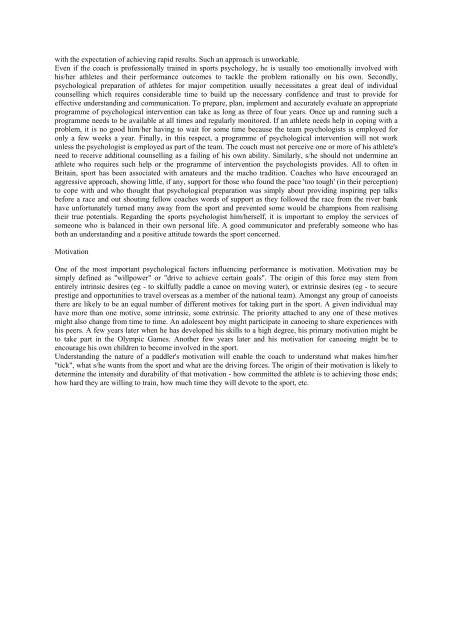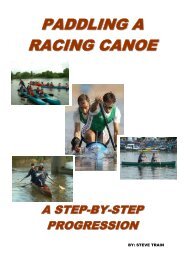The Science of Canoeing By Richard Cox
The Science of Canoeing By Richard Cox
The Science of Canoeing By Richard Cox
You also want an ePaper? Increase the reach of your titles
YUMPU automatically turns print PDFs into web optimized ePapers that Google loves.
with the expectation <strong>of</strong> achieving rapid results. Such an approach is unworkable.<br />
Even if the coach is pr<strong>of</strong>essionally trained in sports psychology, he is usually too emotionally involved with<br />
his/her athletes and their performance outcomes to tackle the problem rationally on his own. Secondly,<br />
psychological preparation <strong>of</strong> athletes for major competition usually necessitates a great deal <strong>of</strong> individual<br />
counselling which requires considerable time to build up the necessary confidence and trust to provide for<br />
effective understanding and communication. To prepare, plan, implement and accurately evaluate an appropriate<br />
programme <strong>of</strong> psychological intervention can take as long as three <strong>of</strong> four years. Once up and running such a<br />
programme needs to be available at all times and regularly monitored. If an athlete needs help in coping with a<br />
problem, it is no good him/her having to wait for some time because the team psychologists is employed for<br />
only a few weeks a year. Finally, in this respect, a programme <strong>of</strong> psychological intervention will not work<br />
unless the psychologist is employed as part <strong>of</strong> the team. <strong>The</strong> coach must not perceive one or more <strong>of</strong> his athlete's<br />
need to receive additional counselling as a failing <strong>of</strong> his own ability. Similarly, s/he should not undermine an<br />
athlete who requires such help or the programme <strong>of</strong> intervention the psychologists provides. All to <strong>of</strong>ten in<br />
Britain, sport has been associated with amateurs and the macho tradition. Coaches who have encouraged an<br />
aggressive approach, showing little, if any, support for those who found the pace 'too tough' (in their perception)<br />
to cope with and who thought that psychological preparation was simply about providing inspiring pep talks<br />
before a race and out shouting fellow coaches words <strong>of</strong> support as they followed the race from the river bank<br />
have unfortunately turned many away from the sport and prevented some would be champions from realising<br />
their true potentials. Regarding the sports psychologist him/herself, it is important to employ the services <strong>of</strong><br />
someone who is balanced in their own personal life. A good communicator and preferably someone who has<br />
both an understanding and a positive attitude towards the sport concerned.<br />
Motivation<br />
One <strong>of</strong> the most important psychological factors influencing performance is motivation. Motivation may be<br />
simply defined as "willpower" or "drive to achieve certain goals". <strong>The</strong> origin <strong>of</strong> this force may stem from<br />
entirely intrinsic desires (eg - to skilfully paddle a canoe on moving water), or extrinsic desires (eg - to secure<br />
prestige and opportunities to travel overseas as a member <strong>of</strong> the national team). Amongst any group <strong>of</strong> canoeists<br />
there are likely to be an equal number <strong>of</strong> different motives for taking part in the sport. A given individual may<br />
have more than one motive, some intrinsic, some extrinsic. <strong>The</strong> priority attached to any one <strong>of</strong> these motives<br />
might also change from time to time. An adolescent boy might participate in canoeing to share experiences with<br />
his peers. A few years later when he has developed his skills to a high degree, his primary motivation might be<br />
to take part in the Olympic Games. Another few years later and his motivation for canoeing might be to<br />
encourage his own children to become involved in the sport.<br />
Understanding the nature <strong>of</strong> a paddler's motivation will enable the coach to understand what makes him/her<br />
"tick", what s/he wants from the sport and what are the driving forces. <strong>The</strong> origin <strong>of</strong> their motivation is likely to<br />
determine the intensity and durability <strong>of</strong> that motivation - how committed the athlete is to achieving those ends;<br />
how hard they are willing to train, how much time they will devote to the sport, etc.



